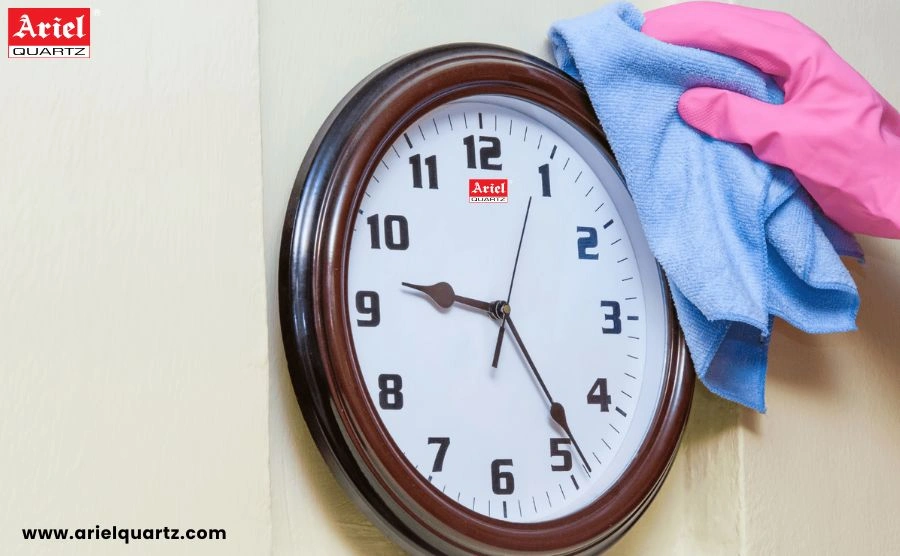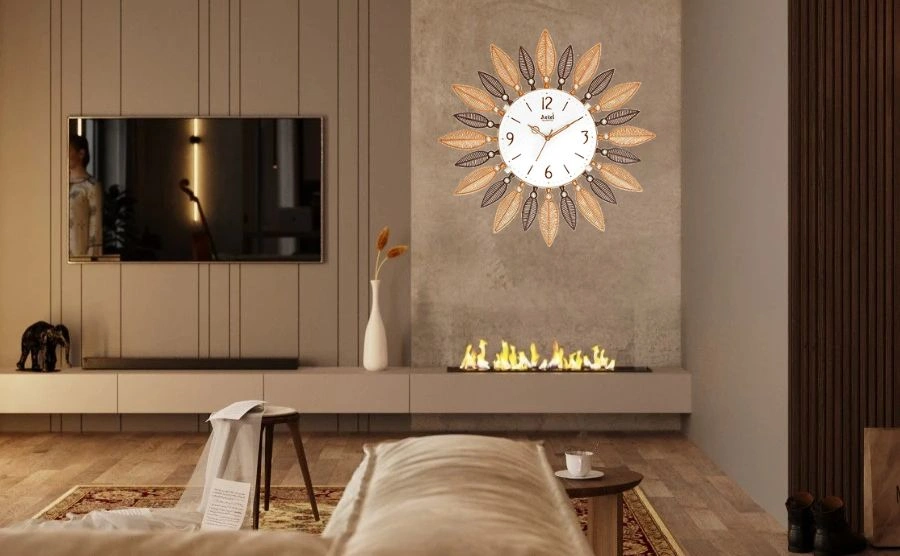
Vastu Principles For Wall Clocks That You Must Know [Updated]
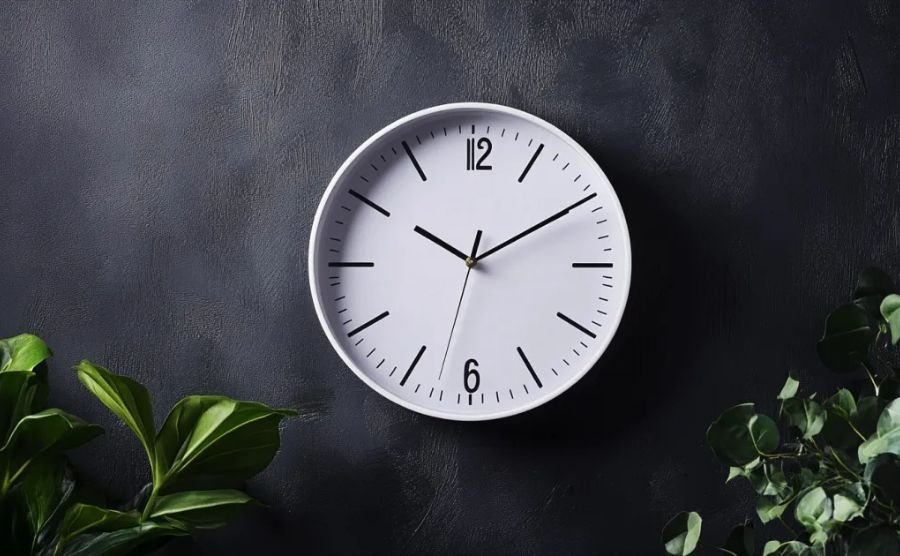
Nowadays, wall clocks are available with a wide range of choices, including sizes, designs, and colors. No doubt, these lucrative design styles and choices provide us with irreplaceable wall clock decor options. However, selecting a clock and its placement in a home doesn't depend only on physical appearance.
Vastu Shastra is another crucial component in selecting and placing the wall clock. Following the right Vastu tips, you can mitigate negative energy and maintain a positive flow of energy in your home and office. Let's understand how wall clock Vastu principles can bring harmony to your space.
Importance Of Wall Clock Vastu Principles
Vastu Shastra, the ancient Indian science of architecture and design, holds significant importance in arranging objects within a home to ensure positive energy flow. A wall clock, often considered a simple timekeeping device, is also seen as a symbol of the passage of time and has its Vastu-related significance. The placement of a wall clock can influence the energy and ambiance of a home, affecting prosperity and well-being.
For example, according to the Vastu principle, wall clocks should be placed in the north or east wall. The north direction is ruled by Kubera, the god of wealth, while the east is associated with growth and progress. Placing a clock in either of these directions is believed to attract prosperity, success, and positive energy. Furthermore, the clock should always be in good working condition.
A broken or non-functional clock can symbolize stagnation and missed opportunities in life. Therefore, placing wall clocks as per Vastu Shastra can enhance the energy of a space and bring harmony.
Vastu Wall Clock Guide: Know the Best Directions, Colors & Sizes
1. Wall Clock Direction As Per Vastu
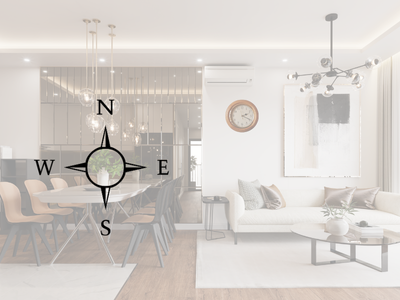
In Vastu Shastra, the placement of a wall clock in the home is more than just a matter of convenience. It plays a crucial role in influencing the energy flow, well-being, and prosperity of the occupants. A clock represents time, and time is considered one of the most powerful forces governing our lives. Therefore, where you place a clock in your house can either invite positive energy or create disturbances.
The north direction is the most recommended spot for a wall clock according to Vastu. This direction is governed by Kubera, the god of wealth, and placing a clock here is believed to attract financial growth and abundance. The north also symbolizes new opportunities, so a clock in this area can help bring positive changes in life.
The east direction is another favorable spot. Ruled by Indra, the god of growth, the East is associated with progress, success, and new beginnings. It helps promote overall growth and clarity of purpose for the family.
Vastu also advises avoiding the south direction for placing clocks. This direction is associated with Yama, the god of death, and having a clock here could bring negative energy, delays in progress, or obstacles in life. Similarly, clocks should not be placed directly above the main door, as this can block the flow of positive energy entering the home.
2. Wall Clock Vastu As Per Colour

According to Vastu Shastra, the color of a wall clock plays a crucial role in attracting positive energy and influencing the overall atmosphere of a space. Just like the placement, the clock’s color should harmonize with the direction it is placed in. It ensures the best flow of energy and prosperity.
- Clocks placed in the north, which is ruled by Kubera, should ideally be of green, blue, or silver shades. These colors are believed to enhance wealth and attract positive energy.
- The east direction symbolizes growth and progress, and the recommended colors for clocks placed here are light wood, brown, or off-white tones. These earthy colors represent stability, growth, and harmony. It can seamlessly align with the energy of this direction.
- Although not the most recommended direction for a clock, if it’s placed in the west, use metallic colors like gray, white, or silver. These shades bring stability and help maintain a calm and peaceful environment.
- While placing a clock in the south is generally discouraged, if necessary, choose colors like red or orange, which symbolize energy and transformation.
It’s essential that the clock color complements the overall décor of the space and radiates positivity. Bright and cheerful colors like gold, silver, or pastel shades are often considered auspicious, while dark or dull colors like black or grey are generally avoided unless they harmonize with the room’s energy.
3. Wall Clock Size As Per Vastu
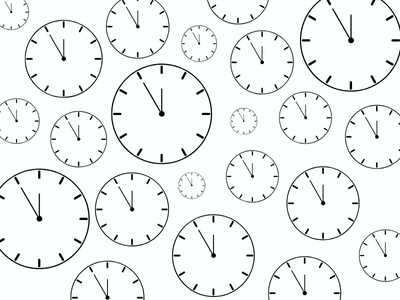
In Vastu Shastra, the size of a wall clock plays a significant role in influencing the energy it radiates within a space. The right size of a clock can contribute to a positive flow of energy and help maintain balance in the home.
Large Clocks are considered more suitable for the living room or common areas. These larger clocks are believed to represent progress, growth, and movement. However, care should be taken that the clock is not too overwhelming in size. This could disrupt the energy balance by creating a sense of imbalance or heaviness in the room.
Smaller clocks are ideal for bedrooms or more personal spaces. They are less dominating and help create a more relaxed and peaceful atmosphere. A small clock should still be clearly visible.
According to Vastu, clocks should not be too small, as this can symbolize limitations and restricted progress. Regardless of the size, the clock should be proportionate to the room and the wall it is placed on. It ensures a harmonious look that aligns with the positive energy flow.
4. Vastu Tips For a Wall Clock In the Office
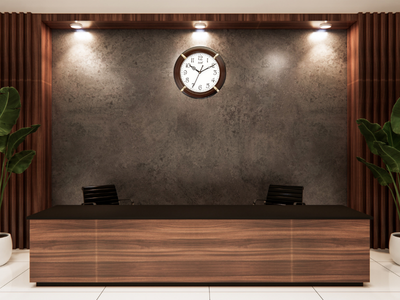
- Place the clock in the north direction to attract financial growth and prosperity.
- Avoid placing the clock in the south direction, as it can hinder professional growth.
- The clock should be easily visible from all areas to represent clarity in work.
- A clock with a smooth ticking sound is preferred for a calm and productive environment.
- Avoid loud, harsh ticking, which can create tension and distractions.
- Keep clocks clean and well-maintained to avoid negativity.
- Avoid placing clocks directly facing mirrors, as they reflect negative energy.
- Opt for round or square clocks for balanced energy flow.
- Avoid placing clocks near sharp objects or cluttered areas to prevent disturbed energy.
- Do not display too many clocks in one office space, as it can lead to time pressure and stress.
- Clocks made of wood or metal are ideal for office spaces to promote stability and strength.
5. Vastu Tips For a Wall Clock In a Temple
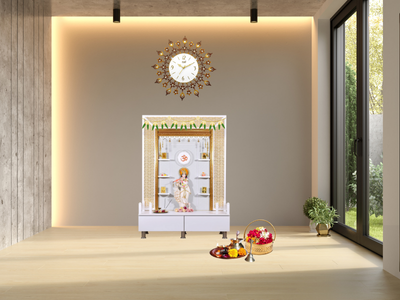
- Choose a clock with a silent mechanism to preserve the peaceful and serene environment of the temple.
- Opt for clocks with spiritual symbols like OM or mandalas for enhanced positive vibrations.
- Ensure the clock has a soothing design to match the calmness of the temple area.
- Avoid clocks with alarm features, as sudden sounds can disrupt the meditation or prayer space.
- The clock should be simple and non-flashy to maintain the temple's sacredness.
- Choose clocks with natural colors like white, cream, or light pastels, symbolizing purity and devotion.
- Avoid placing the clock in the southwest corner of the temple, as this area is reserved for spiritual focus.
- The clock should not face the main entrance of the temple, as it may distract from worship.
- Ensure the clock is made of natural materials like wood to resonate with the temple's purity.
- Avoid clocks with sharp edges or designs, as they can create aggressive energy in a peaceful space.
- Place the clock at a height that does not obstruct the view of the deities or altar.
- Opt for a minimalist clock design, reflecting simplicity and devotion in the temple space.
- Avoid placing the clock in front of the prayer mat or meditation area, as it may disrupt concentration.
Wall Clock Shape as Per Vastu
The shape of a wall clock plays an important role in maintaining positivity in your home. According to Vastu Shastra, round and oval-shaped clocks are the fine selections, as they characterize continuity and stability. These shapes sell an easy float of energy, fostering peace and prosperity. Square clocks are also suitable, but they should have easy edges to prevent bad energy accumulation. However, abnormal or asymmetrical shapes have to be avoided, as they create imbalance and disrupt the natural power that goes with the flow of the home. Choosing the best wall clock shapes ensures that your clock not simplest complements your décor but also draws positivity.
Also Read: The Best Wall Clock Shapes to Elevate Your Decor
Wall Clock Vastu: Places to Avoid
A wall clock's placement is crucial to maintaining a peaceful atmosphere in your private residence. Since these directives are associated with stagnation and economic losses, clocks should never be placed on the south or southwest walls. Furthermore, it is not advised to place a clock above a door as this might generate mental pressure and disturb the flow of power. Because it might cause anxiety and disrupted sleep, a clock in a bedroom that faces the mattress is also seen as unlucky. Always position your wall clock in a location that promotes good fortune and effortless electricity flow.
Which Type of Wall Clock is Good for Home?
The type of wall clock you choose affects the energy it brings into your home. Pendulum wall clocks are considered auspicious as their rhythmic movement symbolizes balance and consistency. Clocks made of wood or metal are ideal, as they bring warmth and stability, whereas broken or rusted clocks should be avoided. Choosing clocks in bright colours such as gold, yellow, or white enhances positivity and good fortune. Additionally, a simple dial with Roman numerals or clear markings is preferable, as it represents clarity in life. A well-maintained, aesthetically pleasing clock ensures harmony and continuous progress in your home.
Wall Clock Vastu Quick Facts Table
| Aspect | Recommendation |
| Best Directions | North, East, Northeast |
| Location to avoid | The main entrance, near the electrical items |
| Avoid Directions | South, Southeast, Southwest |
| Ideal Shapes | Round, Oval |
| Avoid Shapes | Irregular, Sharp-Edged |
| Best Materials | Wood, Metal |
| Avoid Materials | Broken, Rusted Clocks |
| Maintenance | Ensure clocks are working, and no dead batteries |
Final Thoughts
Incorporating Vastu tips for your wall clock may seem like a small detail, but it can have a big impact on the energy flow in your home or office. Whether it's placing your clock in the right direction or ensuring it ticks smoothly, these guidelines can help keep your space balanced and your life running on time.

